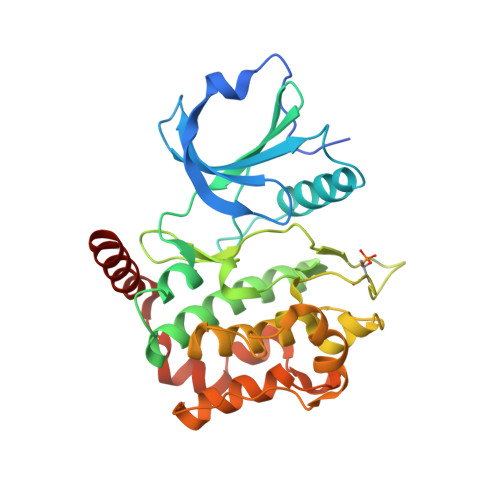Discovery of Diverse Small-Molecule Inhibitors of Mammalian Sterile20-like Kinase 3 (MST3).
Olesen, S.H., Zhu, J.Y., Martin, M.P., Schonbrunn, E.(2016) ChemMedChem 11: 1137-1144
- PubMed: 27135311
- DOI: https://doi.org/10.1002/cmdc.201600115
- Primary Citation of Related Structures:
4QML, 4QMM, 4QMN, 4QMO, 4QMP, 4QMQ, 4QMS, 4QMT, 4QMU, 4QMV, 4QMW, 4QMX, 4QMY, 4QMZ, 4QNA, 4QO9 - PubMed Abstract:
Increasing evidence suggests key roles for members of the mammalian Sterile20-like (MST) family of kinases in many aspects of biology. MST3 is a member of the STRIPAK complex, the deregulation of which has recently been associated with cancer cell migration and metastasis. Targeting MST3 with small-molecule inhibitors may be beneficial for the treatment of certain cancers, but little information exists on the potential of kinase inhibitor scaffolds to engage with MST3. In this study we screened MST3 against a library of 277 kinase inhibitors using differential scanning fluorimetry and confirmed 14 previously unknown MST3 inhibitors by X-ray crystallography. These compounds, of which eight are in clinical trials or FDA approved, comprise nine distinct chemical scaffolds that inhibit MST3 enzymatic activity with IC50 values between 0.003 and 23?¦̀m. The structure-activity relationships explain the differential inhibitory activity of these compounds against MST3 and the structural basis for high binding potential, the information of which may serve as a framework for the rational design of MST3-selective inhibitors as potential therapeutics and to interrogate the function of this enzyme in diseased cells.
Organizational Affiliation:
Drug Discovery Department, Moffitt Cancer Center, Tampa, FL, 33612, USA.



















